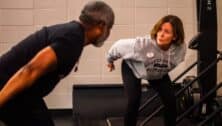The Lincoln Center: On Mindfulness and Meditation
What is the point of practicing mindfulness and meditation?
This question is one I frequently encounter working at the The Lincoln Center for Family and Youth (TLC) in the Mobile Victim Services Program.
For many, the concepts of mindfulness and meditation feel foreign and confusing. It may feel like a lot of work to figure out how to do it, why to do it, and when to do it.
However, with a little guidance, you really cannot go wrong!
Mindfulness Ambassador
My mission has always been to serve clients through art psychotherapy, but TLC has also offered me a platform to be an ambassador for practicing mindfulness and meditation.
John Kabat-Zinn, creator of the popular Mindfulness-Based Stress Reduction (MBSR) program, explains:
“Mindfulness is never about doing something perfectly because it is not about doing or accomplishing at all. It is about allowing things to be as they are, resting in awareness, and then, taking appropriate action when called for. Silence, deep listening, and non-doing are often very appropriate responses in particularly trying moments — not a turning away at all, but an opening toward things with clarity and goodwill, even toward ourselves. Out of that awareness, trustworthy skillful responses and actions can arise naturally, and surprise us with their creativity and clarity.”
At The Lincoln Center for Family and Youth, we believe that mindfulness exercises and meditation practices do make a difference.
We work with students, families, and individuals dealing with a number of daily challenges, traumatic experiences, and mental health struggles.
The common thread is that our clients want to feel better. They want their lives to improve, and even if the circumstances remain the same, they want to cope better with the challenges they encounter. Don’t we all?
The exciting news is, you don’t need to practice for months or years to reap the benefits of mindfulness and meditation!
Get started with these resources
Even a few minutes of mindfulness and meditation can make a significant difference in the course of your day.
The Lincoln Center for Family and Youth created an initiative that posts free videos on Facebook and Twitter (@tlcfamilyyouth) of breathing exercises, mindfulness practices, and brief guided meditations.
The aim of our Meditation Connection initiative is to provide these structured practices to allow beginners (or seasoned meditators) to experience the benefits of a mindful practice anywhere, anytime, at no cost.
The videos are designed to appeal to different age groups, so that there may be an option for anyone who is interested in trying mindfulness and meditation.
We believe that all people deserve access to these tools, and we hope that our community can benefit from the content we are creating.
The videos can benefit children, teens, adults, people struggling with mental health diagnoses, and caregivers or frontline providers struggling with burnout or vicarious trauma.
We hope you can access these mindfulness and meditation resources proactively, and begin your practice today!
Here are the benefits
What are these mysterious benefits of mindfulness and meditation? Well, the most-easily measured effects are primarily physiological – for example, slowing your heart rate, regulating your breathing, and thus, calming the nervous system.
Additionally, studies have shown that mindfulness and meditation are powerful tools in the treatment of anxiety, depression, and mood disorders.
People who meditate have reported such effects as improved concentration, increased tolerance of distress, better social connections, recovery from trauma, and feeling more grounded.
Finally, I will leave you with a quote from Buddhist meditation guru, Pema Chödrön. Whether you choose to begin today or whether you start meditating some other day, I hope you will remember this:
“Meditation practice isn’t about trying to throw ourselves away and become something better. It’s about befriending who we are already.”
More information
Check out these resources!
Chödrön, P. (2018). The Wisdom of No Escape: and the Path of Loving-Kindness. Shambhala.
Kolk, V. B. (2015). The Body Keeps the Score: Brain, Mind, and Body in the Healing of Trauma (Reprint ed.). Penguin Publishing Group.
Taft, M. W. (2015). The Mindful Geek: Secular Meditation for Smart Skeptics (001 ed.). Cephalopod Rex.
FAQ for Guided Mindfulness Meditation Practices – Mindfulness Meditation. (2021). Mindfulness Meditation. https://www.mindfulnesscds.com/pages/faq
Learn more here about The Lincoln Center for Family and Youth.
Connect With Your Community
Subscribe to stay informed!
"*" indicates required fields

























![95000-1023_ACJ_BannerAd[1]](https://vista.today/wp-content/uploads/2023/03/95000-1023_ACJ_BannerAd1.jpg)






















